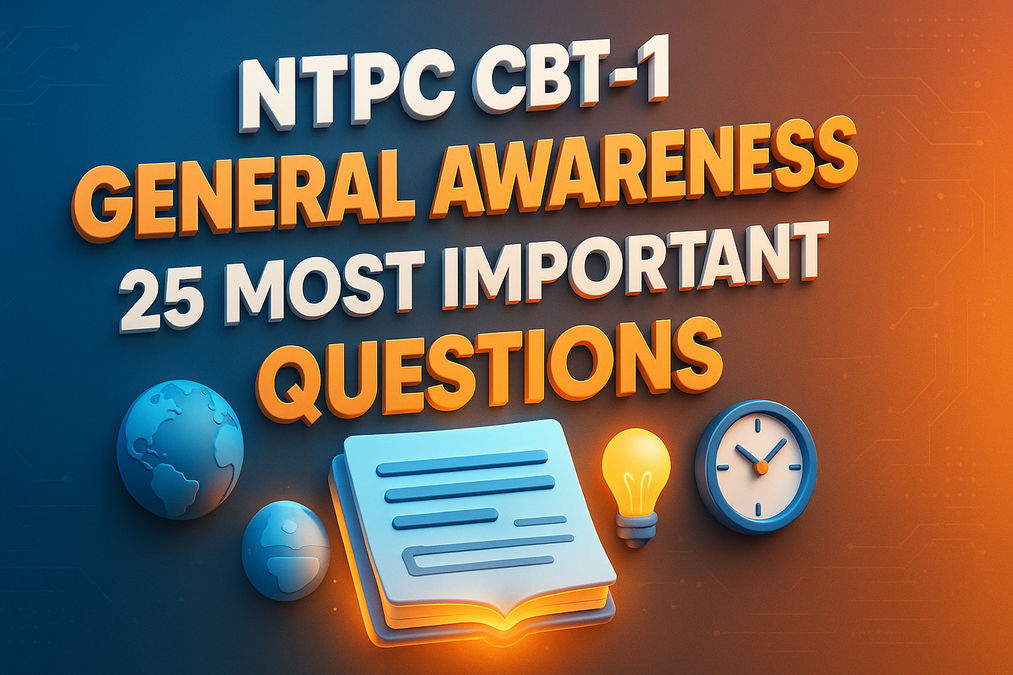NTPC CBT-1 General Awareness: 25 Most Important Questions

Focus Keyword: NTPC CBT-1 General Awareness
The General Awareness section in the NTPC CBT-1 exam is pivotal, encompassing topics from history, geography, polity, science, and current affairs. A strong grasp of these subjects can significantly enhance your overall score. This blog post presents 25 essential multiple-choice questions (MCQs) to aid your preparation.
📘 25 Important General Awareness Questions
Question 1:
Which Article of the Indian Constitution deals with the Right to Education?
Answer: B) Article 21A
Explanation: Article 21A mandates the State to provide free and compulsory education to all children aged 6 to 14 years.
Question 2:
Who was the first woman Governor of an Indian state?
Answer: A) Sarojini Naidu
Explanation: Sarojini Naidu became the first woman Governor of Uttar Pradesh in 1947.
Question 3:
Which of the following is the largest planet in our solar system?
Answer: B) Jupiter
Explanation: Jupiter is the largest planet in our solar system, known for its massive size and prominent gas composition.
Question 4:
Who wrote the famous book 'Discovery of India'?
Answer: B) Jawaharlal Nehru
Explanation: 'Discovery of India' was authored by Jawaharlal Nehru during his imprisonment in 1942–46, providing a broad view of Indian history and culture.
Question 5:
What is the capital of Australia?
Answer: C) Canberra
Explanation: Canberra is the capital city of Australia, selected as a compromise between rivals Sydney and Melbourne.
Question 6:
Which element has the chemical symbol 'O'?
Answer: B) Oxygen
Explanation: The chemical symbol 'O' stands for Oxygen, a vital element for respiration in living organisms.
Question 7:
Which Indian state is known as the 'Land of Five Rivers'?
Answer: B) Punjab
Explanation: Punjab is referred to as the 'Land of Five Rivers' due to the five major rivers flowing through it: Sutlej, Beas, Ravi, Chenab, and Jhelum.
Question 8:
Who is known as the 'Father of the Indian Constitution'?
Answer: B) B. R. Ambedkar
Explanation: Dr. B. R. Ambedkar was the principal architect of the Indian Constitution and served as the Chairman of the Drafting Committee.
Question 9:
Which gas is most abundant in the Earth's atmosphere?
Answer: B) Nitrogen
Explanation: Nitrogen makes up about 78% of the Earth's atmosphere, making it the most abundant gas.
Question 10:
Which Mughal emperor built the Taj Mahal?
Answer: C) Shah Jahan
Explanation: The Taj Mahal was commissioned by Emperor Shah Jahan in memory of his wife Mumtaz Mahal.
Question 11:
Which river is known as the 'Sorrow of Bihar'?
Answer: B) Kosi
Explanation: The Kosi River is called the 'Sorrow of Bihar' due to its frequent floods causing damage in the region.
Question 12:
Which city is known as the Pink City of India?
Answer: A) Jaipur
Explanation: Jaipur is known as the Pink City because of the pink-colored buildings in the old city area.
Question 13:
Which is the smallest state in India by area?
Answer: A) Goa
Explanation: Goa is the smallest Indian state by area.
Question 14:
Who was the first Indian woman to go to space?
Answer: B) Kalpana Chawla
Explanation: Kalpana Chawla was the first Indian woman in space, aboard the Space Shuttle Columbia in 1997.
Question 15:
When is World Environment Day celebrated?
Answer: B) 5 June
Explanation: World Environment Day is celebrated on 5th June every year to raise awareness about environmental protection.
Question 16:
Which planet is known as the Red Planet?
Answer: B) Mars
Explanation: Mars is called the Red Planet due to the presence of iron oxide, which gives it a reddish appearance.
Question 17:
Which is the highest civilian award in India?
Answer: C) Bharat Ratna
Explanation: Bharat Ratna is the highest civilian award given for exceptional service in any field of human endeavor.
Question 18:
In which year did India gain independence?
Answer: C) 1947
Explanation: India gained independence from British rule on August 15, 1947.
Question 19:
Who was the first President of independent India?
Answer: A) Rajendra Prasad
Explanation: Dr. Rajendra Prasad was the first President of India, serving from 1950 to 1962.
Question 20:
Which organ purifies our blood?
Answer: D) Kidneys
Explanation: Kidneys filter waste from the blood and excrete it as urine, playing a major role in blood purification.
Question 21:
Which state in India has the longest coastline?
Answer: B) Gujarat
Explanation: Gujarat has the longest coastline of any Indian state, extending over 1600 km.
Question 22:
What is the national aquatic animal of India?
Answer: B) River Dolphin
Explanation: The Ganges River Dolphin is the national aquatic animal of India.
Question 23:
Which monument is known as the "Symbol of Love"?
Answer: C) Taj Mahal
Explanation: The Taj Mahal, built by Shah Jahan in memory of his wife Mumtaz, is called the symbol of love.
Question 24:
Which is the largest desert in India?
Answer: A) Thar Desert
Explanation: The Thar Desert is the largest desert in India, located in the northwestern region.
Question 25:
Which is the largest freshwater lake in India?
Answer: A) Wular Lake
Explanation: Wular Lake in Jammu & Kashmir is the largest freshwater lake in India.
Conclusion
Regular practice of General Awareness questions enhances your knowledge and confidence. Ensure you stay updated with current events and revise historical and scientific facts. Consistent preparation is key to success in the NTPC CBT-1 exam.
Call to Action
Stay tuned for our upcoming blog posts covering the Mathematics and General Intelligence & Reasoning sections of the NTPC CBT-1 exam. Subscribe to our newsletter for the latest updates and study materials.
Subscribe Now
Join the conversation